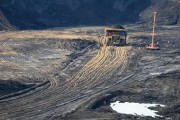Next week, an important piece of legislation will continue through its third reading in the Alberta legislature. Bill 31, the protecting Alberta’s environment act, would establish the Alberta Environmental Monitoring, Evaluation and Reporting Agency (AEMERA) to obtain relevant scientific data and information regarding the condition of the environment in Alberta. The bill requires this information to be public and would centralize current monitoring activities by government, industry and communities in the areas of air, water, land and biodiversity.
While the bill is essential to establish an independent monitoring agency — a goal we support — the proposed legislation has some basic flaws. Even more concerning, the government has been surprisingly closed-minded in responding to amendments proposed in the legislature that would enhance the bill.
Last week, recognizing the potential risks to Alberta’s environmental reputation if the bill were passed in its current state, the opposition convened into the wee hours of the night on Nov. 5, to introduce 18 amendments to enhance the agency’s transparency and independence from government.
Despite the bill’s shortcomings, government defeated all of the proposed amendments without an explanation or discussion. Since the monitoring agency is supposed to lay the foundation of Alberta’s “world class” environmental regulations, transparency and leadership, it’s disappointing that the government is not taking advantage of this opportunity to enhance their legislation when confronted with valid concerns.
Potential for political interference
AEMERA is intended to become the primary scientific authority on environmental quality in Alberta. Its development was informed by recommendations from numerous academic, ENGO and even government evaluations that indicate that the province’s current approach to monitoring is not well coordinated or integrated, and that it requires a more rigorous scientific foundation.
One of the key requirements of a credible monitoring agency identified in those recommendations is that it needs to be an independent entity, free from influence by government or industry, to ensure that information is presented based on scientific merit and not diluted or delayed by politics.
Unfortunately, Bill 31 does not create the conditions necessary to ensure that independence. Instead, it includes checkpoints with government that could easily allow for political interference.
Under Bill 31, the monitoring agency would be governed by a board of directors appointed by the government. However, the bill does not include any requirements for equal or fair representation from all stakeholders. This board would be responsible for appointing members to a science advisory panel that similarly has no requirements for scientific credentials. These appointments can be made on any basis the government chooses, effectively undermining AEMERA’s independence from the government.
In committee, Environment and Sustainable Resource Development Minister Diana McQueen assured the opposition that she would use appropriate criteria to appoint members to the board, that they would have a solid understanding of environmental issues in Alberta, familiarity with the monitoring program, expertise in environmental science, and a host of other soft skills. Perhaps Minister McQueen has thought long and hard about what is necessary to serve on the board — but what happens when the next minister takes office? Or three ministers from now? The requirements need to be made clear and transparent to ensure the agency will remain independent into the future.
The risks of political interference are further increased with a requirement that reporting frequency be “determined by the Agency in consultation with the Minister” prior to any public reporting from the monitoring agency, easily allowing political considerations to affect the timing of the release of important environmental information. In the wake of the recent breach of a tailings pond at the Sherritt International Obed coal mine, it’s evident that Alberta Environment and Sustainable Resource Development still has an institutional tendency to react to potential environmental disasters by withholding information rather than making as much information as possible public.
Crafting effective legislation
Regardless of political affiliation, we can all agree that a healthy environment is in the best interest of all Albertans. The government’s efforts to improve the rigour of environmental monitoring are commendable — yet the desire to control the message risks repeating past failures and tarnishing the quality of data (not to mention the appearance of transparency and independence) that the new monitoring system would provide.
The opposition has raised valid concerns about the proposed environmental monitoring legislation. For this legislation to be effective, the Alberta government must put politics aside and leave the essential duty of monitoring the health of our environment to independent experts.
Passing Bill 31 as it now stands would miss a profound opportunity to improve Alberta’s image, along with its approach to environmental stewardship.
Editor's note: Click here for the full list of the 18 amendments that were suggested by the opposition during Committee of the Whole on November 5, 2013. Each amendment was voted down with very little explanation provided by the Government. To read the full discussion of each proposed amendment see the November 5, 2013 Hansard.










